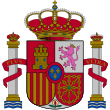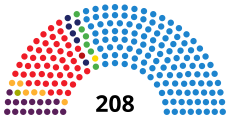Spanish Cortes
|
General Courts Cortes Generales |
|
|---|---|
| 12th legislature | |
 |
|
| Type | |
| Type | |
| Houses |
Senate Congress of Deputies |
| Leadership | |
| Structure | |
| Seats |
616 266 senators 350 deputies |
 |
|
|
Senate political groups
|
|
 |
|
|
Congress of Deputies political groups
|
|
| Elections | |
|
Senate last election
|
26 June 2016 |
|
Congress of Deputies last election
|
26 June 2016 |
|
Senate next election
|
before 2019 |
|
Congress of Deputies next election
|
Before 2019 |
| Meeting place | |
|
Senate Palacio del Senado Plaza de la Marina Española Centro, Madrid Kingdom of Spain Congress of Deputies Palacio de las Cortes Carrera de San Jerónimo Centro, Madrid Kingdom of Spain |
|
| Website | |
| Cortes Generales (Spanish) | |
The Cortes Generales (Spanish pronunciation: [ˈkortes xeneˈɾales], General Courts) is the legislature of Spain. It is a bicameral parliament, composed of the Congress of Deputies (the lower house) and the Senate (the upper house). The Cortes has power to enact any law and to amend the constitution. Moreover, the lower house has the power to confirm and dismiss the President of the Government (prime minister).
The system of Cortes arose in the Middle Ages as part of feudalism. A "Corte" was an advisory council made up of the most powerful feudal lords closest to the king. The Cortes of León was the first parliamentary body in Western Europe. From 1230, the Cortes of Leon and Castile were merged, though the Cortes' power was decreasing. Prelates, nobles and commoners remained separated in the three estates within the Cortes. The king had the ability to call and dismiss the Cortes, but, as the lords of the Cortes headed the army and controlled the purse, the King usually signed treaties with them to pass bills for war at the cost of concessions to the lords and the Cortes.
With the reappearance of the cities near the 12th century, a new social class started to grow: people living in the cities were neither vassals (servants of feudal lords) nor nobles themselves. Furthermore, the nobles were experiencing very hard economic times due to the Reconquista; so now the bourgeoisie (Spanish , from burgo, city) had the money and thus the power. So the King started admitting representatives from the cities to the Cortes in order to get more money for the Reconquista. The frequent payoffs were the "Fueros", grants of autonomy to the cities and their inhabitants. At this time the Cortes already had the power to oppose the King's decisions, thus effectively vetoing them. In addition, some representatives (elected from the Cortes members by itself) were permanent advisors to the King, even when the Cortes were not.
...
Wikipedia
